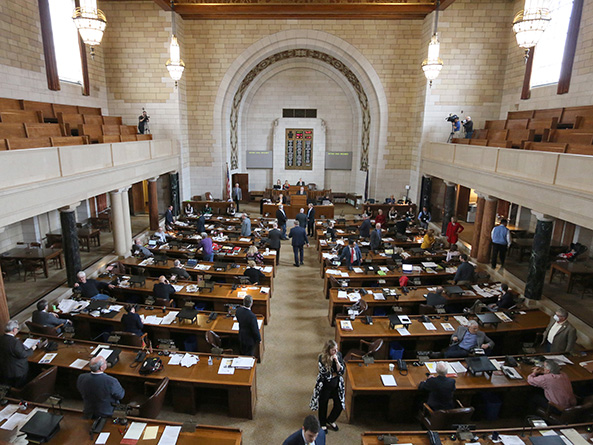2020 session to resume July 20. Many late nights expected with only 17 days left.
State Director Bob Hallstrom reports from Lincoln on the small-business agenda
Speaker of Legislature Jim Scheer (Norfolk) has announced that state lawmakers will be called back into session on July 20 to resume the 2020 session, which was suspended on March 17 due to COVID–19 related concerns.
With only 17 legislative days remaining in the 2020 session, the Speaker has indicated that the Legislature will be conducting many late-night sessions in an effort to finish up the people’s business.
While the Legislature will continue to focus on priorities, such as property tax relief and economic development incentives, the uncertainty of the pandemic’s effect on the state budget may require lawmakers to adjust their expectations. In this regard, the Speaker has suggested to his fellow senators that they may need to reduce or eliminate the fiscal impact of their individual priority bills in order to minimize the impact to the General Fund.
Coronavirus Relief Funds
Gov. Pete Ricketts has unveiled how the state of Nebraska plans to use federal coronavirus funds to spur the state’s economy. The state is receiving $1.25 billion through the CARES Act to aid coronavirus relief efforts, of which, $166 million will go to Douglas County.
The governor has established priorities for use of the relief funds, including:
- stabilizing businesses and livestock producers
- supporting community institutions to meet critical needs such as food security, shelter, and mental health care
- reimbursing state and local governments for coronavirus-related expenses
- shoring up the state’s Unemployment Insurance Trust Fund and potential General Fund budget flexibility.
Nebraska is expected to spend the federal relief funds in the following ways:
- Community CARES program to provide food security, housing, and behavioral health care: $85 million.
- Reimbursements to state and local government for coronavirus-related expenses: $180 million.
- Agriculture & businesses: $392 million.
-
- Small business stabilization: $230 million
- Livestock producer stabilization: $100 million
- Rural broadband remote access grant program: $40 million
- Workforce retraining initiative: $16 million
- Administrative support to all business programs: $5 million
- Gallup business stabilization and growth training: $1 million
(Small businesses and livestock producers could get $12,000 grants, which would be more flexible than the Paycheck Protection Program loans and available for a wider variety of businesses.)
- Unemployment Trust Fund and potential General Fund Budget Flexibility: $427 million.
Previous Reports and News Releases

